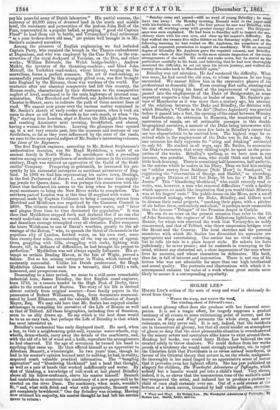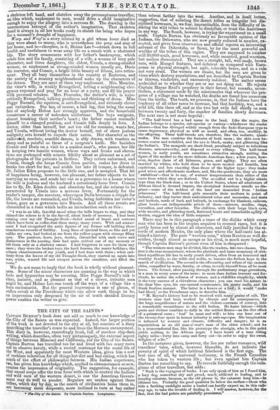HOLUB LEE.*
HOLM LEE'S notion of the uses of warp and woof is obviously de- rived from Gray :
" Weave the warp, and weave the woof, The winding-sheet of Edward's race;
and a most gloomy effect does she produce with her funereal occu- pation. It is not a tragic effect, for tragedy supposes a gradual tendency of all events to some culminating point of horror, and the i horrors in Warp and Woof permeate the whole story, and never culminate, as they never end. It is not, indeed, that the incidents are in themselves all gloomy, but that all occur amidst an atmosphere of gloom so deep that the most pleasurable situation is overshadowed by the misery actors and spectators alike know to exist around them. Reading her books, one could fancy Holme Lee believed the sun created solely to throw shadows. We could deduce from her works proofs of a tendency she would most strongly repudiate, viz. to reject the Christian faith that Providence is ex reruns =turd beneficent, in favour of the Oriental theory that nature is, on the whole, malignant. So thoroughly is her mind tinged by an appreciative sense of horror that it pervades even her lightest efforts. She has just published an allegory for children, The Wonderful Adventures of Tufiongbo, which nobody but a lunatic would put into a child's hand. Very clever, indeed, it is, so clever that the unconscious, tone of the author's mind has-conquered the artist, and induced her to produce a picture no child of ours shall certainly ever see. Out of a cold stream at the bottom of a black cavern, tenanted by half visible goblins, stretches
• Warp and Woof. By Holme Lee, The Wonderful Adventure; of rivionglio.. Holme Lee. Smith, Elder, and Co.
a skeleton left hand, and clutches away the presumptuous traveller, an idea which, unpleasant to men, would drive a child imaginative enough to enjoy the allegory into a nervous fit. The drawing is the unconscious betrayal of the author's imagination. That skeleton hand is always in all her books ready to clutch the being who hopes for a moment's draught of happiness.
Kap and nails a story related by a girl whose lover died as they were about to marry, who is nevertheless the prop and stay of her home, and is—therefore, is it, Holme Lee P—struck down in full health and usefulness to wear away life on a couch with a shattered hip. The story commences with her father's bankruptcy, which sends him and his family, consisting of a wife, a woman of very pale character, and three daughters, the eldest, Ursula, a strong-minded woman, as unpleasant as strong-minded women usually are, Doris the narrator, and Connie, a bright little beauty of fifteen, into retire- ment. They all bury themselves in the country at Redcross, and the society of a country neighbourhood make up the characters of the drama. They are most of them very unpleasant. Mrs. Maurice, the vicar's wife, is weakly Evangelical, letting a neighbouring cler- gyman expound and pray for an hour at a party, and fill his prayer with personal rebukes. Mrs. Peacocke, the doctor's wife, is hypo- critically Evangelical, talking goodiness and thinking of dress. Miss Pegge Burnell, the squiress, is anti-Evangelical, and viciously clever and outspoken. She has, of course, a bad leg, that being the usual fate of anybody Holnie Lee strongly approves, and the household commence a career of unbroken misfortune. The boys emigrate, almost breaking their mother's heart ; the father cannot reconcile himself to a changed position, and Connie falls deeply in love. A doctor, older than herself, but not too old for romance, wants her, and Ursula, without loving the doctor herself, out of sheer jealous malignity sets herself to impede their union. Her character as the cultivated, resolute, sensible demon, is ably drawn, with touches as sharp and as painful as those of a surgeon's knife. She banishes Connie and Doris on a visit to a maiden aunt's, who passes her life in keeping two lunatic women, whose ways and freaks and aberra- tions are portrayed with minute fidelity about as pleasant as a set of photographs of the patients in Bedlam. They return unharmed, and Ursula, though she keeps Connie from parties, makes her dress in frocks too short for her, and scolds her into ill temper, is defeated. Dr. Julius Eden proposes to the little one, and is accepted. That bit of happiness being, however, too pleasant, her father objects to her marrying so soon, and sends her out as a governess to a house where the wife is jealous and the husband a notoriously loose liver. Connie has to fly, Dr. Eden doubts and abandons her, and she returns to be persecuted by Ursula into a nervous fever. Fortunately for the reader's temper, she recovers, whereupon Doris becomes a cripple for life, the lovers are reconciled, and Ursula, being forbidden her sister's house, goes as a governess into Russia. And all these events are chronicled in a tone which befits an introduction such as this : " I was in an idle, fanciful mood when the bells began to ring, and they chimed the echoes to it in the far-off, silent lands of memory. I had been turning over my old Thought-Book—faded annal of hopes and sorrows which have been as coffin-dust these many, many years. With sad amaze- ment I had recognized the antic figures of my former self inditing these treacherous records of futility. Long lines of spectral faces, so like and yet unlike my own, had looked at me from the yellow pages with strange filmy eyes. The passions, fears, joys, doubts, chronicled with such verve and distinctness in the passing, time had quite .rubbed out of my memory or left them only as a shadowy smear. I had forgotten to care for them any more ; they were the broken toys, the hard lessons, the merry holidays, the solemn chastisements of my youth, and I had done with them ; when sud- denly from the leaves of my old Thought-Book, they started up again into wan, white, wasted life and trooped across the sunshine, and filled the room."
We do not mean to imply that the book is wholly without pleasant- ness. Some of the minor characters are amming, in the way in which fools and hypocrites may be amusing, Miss Pegge Burnell's talk is clear, incisive, and as pleasant as that of a clever, irritable man might be, and Holme Lee can touch off the ways of a village like a born caricaturist. But the general impression is one of gloom, of sullen revolt at the Providence which can allow such things to be, an impression only deepened by the air of truth decided literary power enables the writer to give.































 Previous page
Previous page